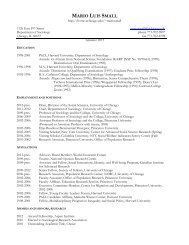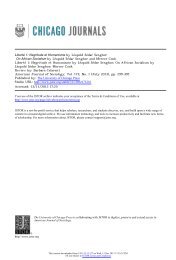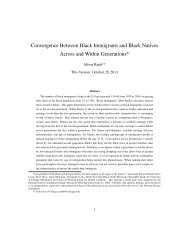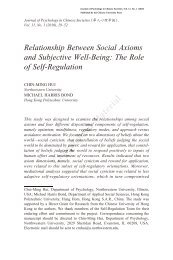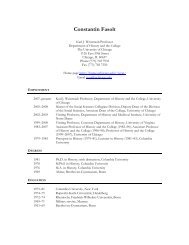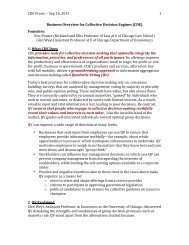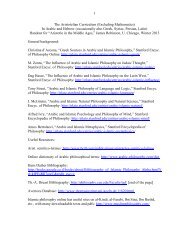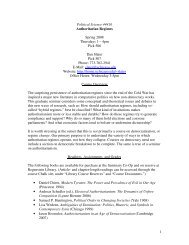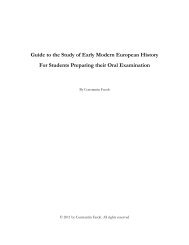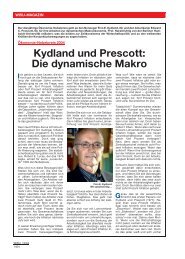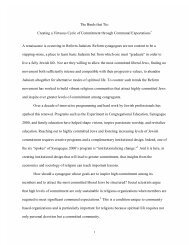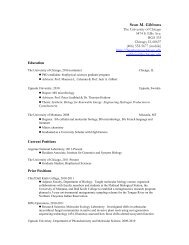Job Market Paper - Personal Web Pages - University of Chicago
Job Market Paper - Personal Web Pages - University of Chicago
Job Market Paper - Personal Web Pages - University of Chicago
Create successful ePaper yourself
Turn your PDF publications into a flip-book with our unique Google optimized e-Paper software.
Kim: Endogenous Choice <strong>of</strong> a Mediator<br />
pay<strong>of</strong>fs are in the virtual utility scales v i (·, ·, λ, α, β) with respect to λ, α, and β, instead <strong>of</strong> u i (·, ·),<br />
and these virtual utility pay<strong>of</strong>fs are transferable among the players. If (λ, α, β) satisfy the interim<br />
incentive efficiency conditions for µ and α i (s i |t i ) > 0, then we say that type t i jeopardizes type s i . A<br />
positive Lagrange multiplier α i (s i |t i ) implies that t i can only jeopardize s i in µ if the informational<br />
incentive constraint is binding for µ.<br />
In the bargaining problem Γ considered in this paper, I obtain the following corollaries.<br />
Corollary 3. When ¯p(s) ≤ p ∗ , for the neutral bargaining solution µ 1,0 , the conditions in Myerson<br />
(1984b)’s Theorem are satisfied for all ε ≥ 0 by any λ i (s) > λ ∗ for some λ ∗ > ¯p(s), α i (s|w) =<br />
α i (w|s) = 0, and β i (s) = β i (w) = 0 for all i.<br />
When ¯p(s) ≤ p ∗ , in the (λ, α, β) virtual bargaining problem with transferable virtual utility<br />
pay<strong>of</strong>fs, no incentive constraints are binding. In other words, the constraints do not matter. The<br />
fact that there are no binding constraints is exactly what makes λ i (t i ) weights different from the<br />
probability weights. In particular, we have λ i (s) > ¯p(s) and λ i (w) < ¯p(w) for all i. For the neutral<br />
bargaining solution µ 1,0 when ¯p(s) ≤ p ∗ , the type-dependent weights λ i (t i ) are necessarily distorted<br />
in a way that they scale up the actual utility <strong>of</strong> the strong type and scale down the actual utility<br />
<strong>of</strong> the weak type, as if the strong type were more important. Then, the neutral bargaining solution<br />
can be interpreted as if some principal maximizes the ex ante social welfare putting extra welfare<br />
weights on the strong types in the virtual utility characterization. 17<br />
The more interesting cases in the neutral bargaining solutions should be when the incentive<br />
constraints bind; for the benchmark class in my framework, these cases would correspond to when<br />
¯p(s) ∈ (p ∗ , p ∗∗ ).<br />
Corollary 4. When ¯p(s) ∈ (p ∗ , p ∗∗ ), for the neutral bargaining solution µ 1,¯z(¯p(s)) , the conditions<br />
in Myerson (1984b)’s Theorem are satisfied for all ε ≥ 0 by any λ i (s) > λ ∗∗ for some λ ∗∗ > ¯p(s),<br />
some α i (s|w) > 0, α i (w|s) = 0, and β i (s) = β i (w) = 0 for all i.<br />
When ¯p(s) ∈ (p ∗ , p ∗∗ ), the constraint that a player <strong>of</strong> a weak type should not be tempted to<br />
pretend that her type is strong is a binding constraint for the neutral bargaining solution µ 1,¯z(¯p(s)) .<br />
Because the weak type wants to imitate the strong type, the weak type jeopardizes the strong type.<br />
17 Otherwise, the mediator would not have been an equilibrium in any communication game defined. This can be<br />
seen as an analog to being renegotiation-pro<strong>of</strong>. Putting more weight on the strong type’s utility allows the equilibrium<br />
to be interim incentive efficient and inscrutable.<br />
20



